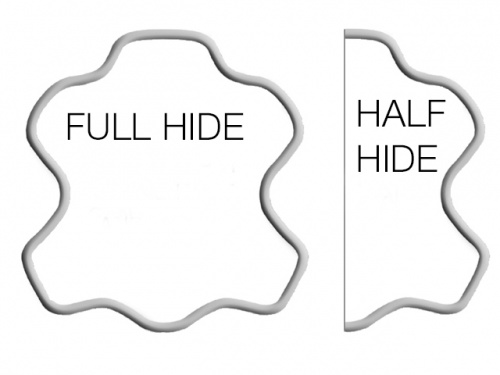Parts of the hide
Bovine leather consists of a network of interconnected, fine skin fibres. These fibres are not connected in the same way at all points of the animal’s body. The structure is denser and narrower in the back part and they are quite loose in the abdominal area, with larger spaces between the fibres. The skin structure is also less stable at the neck part. For this reason, tanners have a special vocabulary for different sections of the animal skin.
Full hide - Half hide
Cowhides are sometimes also sold in halves for car leather or furniture leather (leather cutting waste reduction for large cuts). In shoe manufacture in particular, the use of half skins has become established. When half hides are sold, the skin is cut along the back part of the animal skin/hide. Leather dealers, usually have a price list for "whole skins" and "half skins".
Full hide (whole hide) - Half hide. The skin is cut along the back of the animal skin/hide.
Shoulder - Belly - Butt
The skin sections: Shoulder, belly, butt.
Back = butt + shoulder
The hide is divided in different sections: Shoulder, belly and butt.
- Shoulder: The shoulder is a softer area of the hide.
- Belly: The belly is a stretchy soft leather of varying thickness.
- Butt: The butt is the thickest and strongest part of the hide.
- Back: Butt + shoulder.
Butt in the tannery.
Additional information













 a kotori web solution
a kotori web solution